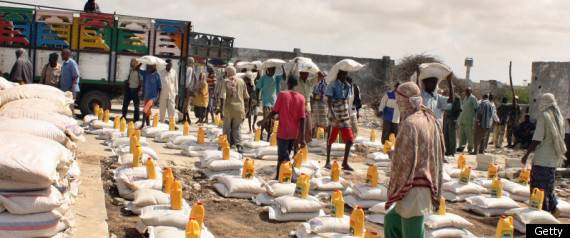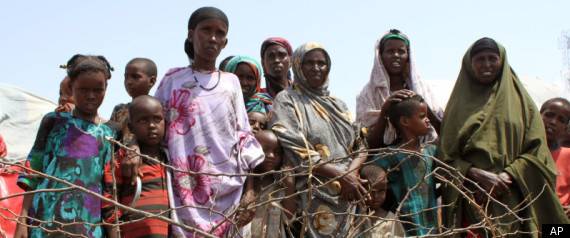WillowTree
Diamond Member
- Sep 15, 2008
- 84,532
- 16,091
- 2,180
Can You say "Black Hawk Down"?
Follow along with the video below to see how to install our site as a web app on your home screen.

Note: This feature currently requires accessing the site using the built-in Safari browser.
And the people suffer at the hands of "leaders"...
And the people suffer at the hands of "leaders"...
But they always blame the USA. Even when bags of corn and rice are imprinted with USA,, they still blame the USA.
Fini, a village so small it doesnt appear on any maps, is growing every day. In tired groups, carrying their few belongings, people trek in from the wilderness, their livestock nearly all dead, their ability to cope exhausted. They are coming to this cluster of three dozen stick shacks by a rarely used sandy track because they have heard someone is bringing water. Out on the empty plain, parched to dust by a drought stretching back three years, there is no water. There is no pasture for their animals.
Even for a hardy people who have adapted for generations to survive in this arid emptiness, this drought is daunting. Like 11.5 million others across Kenya, Ethiopia, and Somalia, they may starve to death unless outside help reaches them. On July 20, the United Nations, which had warned of this looming crisis in January, said that parts of Somalia were now in a state of famine. Famine was last declared in 1984, when almost a million Ethiopians died, and again in 1991-92, in part of Somalia.
International aid agencies, governments, and the UN are appealing for a total of $1.6 billion to deliver supplies to help the worst affected in this latest drought to sweep the Horn of Africa. Already, one Boeing 747 has landed in Kenya full of food, medicine, and tents. More aid is expected. In Somalia, UNICEF has sent supplies by plane to an airstrip thats been off-limits for more than a year, under a deal with Islamist rebels there.
Ships carrying tens of thousands of tons of corn from warehouses in Kuwait have docked in Djibouti, to the north, and Mombasa, to the south. More food is on its way. Theres no doubt that lives have been lost, but there are many, many more that will be saved if the world responds as it must, says Mark Bowden, the UNs humanitarian coordinator for Somalia. The US State Department has announced partial easing of laws that prohibit it from funding appeals if there is any risk that supplies could benefit terrorists. There is a growing sense that the world response is gearing up.
Real crisis lies outside camps
The United Nations declared a famine in parts of Somalia on July 20, a move it rarely makes and only in the most severe circumstances. The following numbers help convey the severity of the situation:
11.5 million People needing urgent help across the Horn of Africa
78,000 Somali refugees who have fled to Kenya or Ethiopia since May
6 per 10,000 Children dying daily in Somalias famine-hit regions
30 Percentage of population so malnourished they need special feeding
20 Percentage of fresh billion-dollar aid appeal funded so far
$300 million Funds needed just for Somalia in the next two months alone
60 Years since it was this dry in some areas
9 Months since early-warning systems predicted potential disaster
4 Months until rain is expected
Source
Why can't we pay South Africa to send Somalia food? It's aid money that benefits South Africa and Somalia.

DOLO, Somalia -- The U.N. will airlift emergency rations this week to parts of drought-ravaged Somalia that militants banned it from more than two years ago a crisis intervention to keep hungry refugees from dying along what an official calls the "roads of death."
The foray into the famine zone is a desperate attempt to reach at least 175,000 of the 2.2 million Somalis whom aid workers have not yet been able to help.
Tens of thousands already have trekked to neighboring Kenya and Ethiopia, hoping to get aid in refugee camps.
Some like Isaac Bulle and his family have nearly nothing left.
"I hope we can cross to Ethiopia, but if we can get help here, we will stay here," said Bulle, who traveled with his two wives and 14 children for 25 days by donkey cart to reach this border town. "Our aim is just to get food. Not to leave the country."
Restarting the aid effort is a huge challenge for the World Food Program, whose workers were previously banned from the region by the al-Qaida-linked militant group al-Shabab. Fourteen WFP employees have been killed in Somalia since 2008. New land mines have severed a key road to Dolo. A landing strip has fallen into disrepair. Old employees must be found and rehired.
The new feeding efforts in the four districts of southern Somalia near the border with Kenya and Ethiopia could begin by Thursday, slowing the flow of tens of thousands of people who have fled their homes in hope of reaching aid.
The Bulle family is parked under the thorny branches of an acacia tree one river crossing from refugee camps in the Ethiopian town of Dollo Ado. They sleep on two tiny straw mats, although the youngest are bedding down on the rocky sand.
Bulle once had 50 cattle, some goats and grew sorghum. But the rains stopped two years ago, and food supplies stored in a cellar lasted the family a year. Then the animals began to die, forcing him to pack up.
When asked how much money he had, Bulle pulls out a thick wad of Somali shillings bills that add up to the equivalent of only 80 cents. His only sign of wealth is a wristwatch.
His whole family survived the journey with no one getting hurt, killed or left behind.
U.N. worker Abdi Nur said that although Bulle was "clever" to pack just enough food to make it, he pointed to the farmer's young children gathered under the acacia tree.
"The kids are getting thinner. You can see," Nur said. "They are getting malnourished."
Nearby, hundreds of women with small children lined up over the weekend to register for the food distribution.
At a separate, less-organized site in the center of Dolo, a scrum of crying children and women in bright scarves pushed, pulled and shoved to register for this week's food distribution.
Dolo is the kind of sleepy African town where little children don't wear pants. Craggy sticks form fences between mud huts. Although a wide, muddy river flows here, the rocky and sandy soil supports little vegetation.
The U.N. says two regions of Somalia are suffering from famine and that 11 million people are in need of aid. But as of Aug. 1, the U.N. is set to declare all of southern Somalia including Dolo a famine zone.
In Rome, the U.N. Food and Agriculture Organization said a coordination conference would be held Wednesday in Kenya.
The U.N. is pressing its efforts to gather $1.6 billion in aid in the next 12 months, with $300 million of that coming in the next three months.
Ertharin Cousin, the U.S. ambassador to the U.N.'s Rome-based food agencies, told reporters she didn't immediately know if the U.S. would boost its contribution on top of what it has already given.
Last week, the U.S. pledged an additional $28 million in aid for the drought crisis on top of more than $431 million in emergency assistance to the Horn of Africa this year.


MOGADISHU, Somalia -- African Union forces have launched an offensive in Somalia's capital so aid agencies can get emergency food supplies to thousands of starving people without coming under attack from al-Qaida-linked militants, an official said Thursday.
The al-Shabab fighters already have killed men who tried to escape the famine with their families, saying it is better to starve than accept help from the West.
Lt. Col. Paddy Ankunda said Thursday that AU peacekeeping forces have conducted a "short tactical offensive operation" in Mogadishu.
"This action will further increase security ... and ensure that aid agencies can continue to operate to get vital supplies to internally displaced," he said.
The devastating famine in the Horn of Africa threatens al-Shabab's hold on areas under its control, with the militants fearing that the disaster will drive away the people they tax and conscript into military service.
In the past, the militants have blocked aid workers from helping those in need in Somalia, fearing that foreign assistance would undermine their control.
A World Food Program plane with 10 tons of peanut-butter paste landed Wednesday in Mogadishu, the first of several planned airlifts in coming weeks.
That will help, but Lt. Col. Kuamurari Katwekyeire, the civil-military coordination chief for the African Union Mission in Somalia, known as AMISOM, said the U.N. and other aid groups need to do more.
It's just now official? Somehow I've been under the impression that Somalia has been in a famine for several years.
Somalia has always had a problem with famine but now its actually worse because they haven't been getting alot of rain and what little crops they did have are gone, add that in with no infrastructure, very little government and a choatic society and this is what you get.

It's just now official? Somehow I've been under the impression that Somalia has been in a famine for several years.
Somalia has always had a problem with famine but now its actually worse because they haven't been getting alot of rain and what little crops they did have are gone, add that in with no infrastructure, very little government and a choatic society and this is what you get.
I hear Pirating is a growth industry
you get this cool hat and learn to 'swash' buckle...